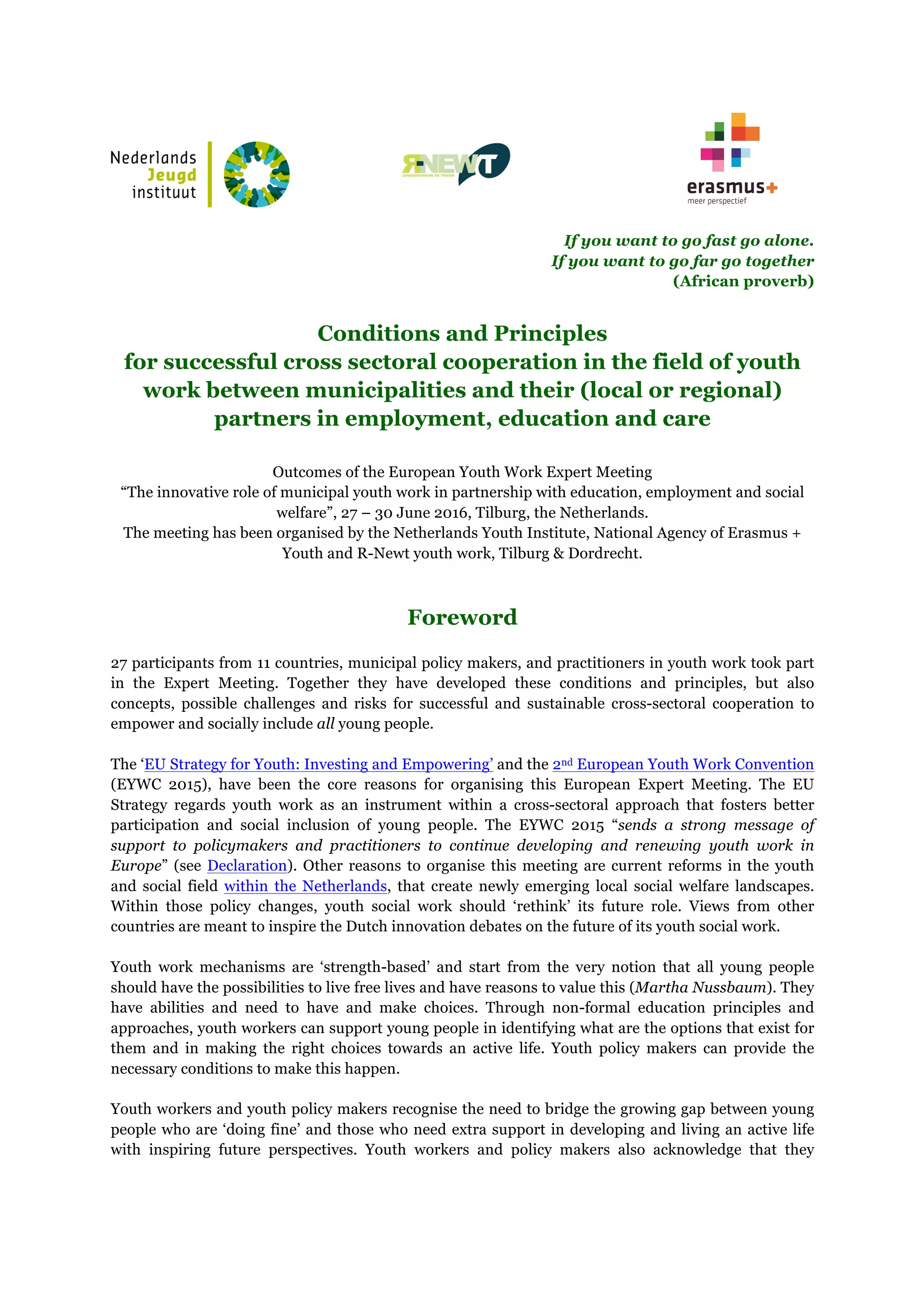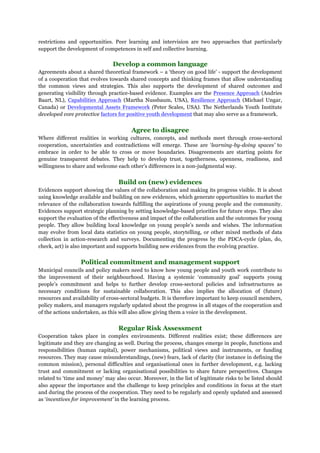1) Youth workers and policymakers met to develop principles for successful cross-sectoral cooperation between municipalities, youth work, education, employment, and social welfare to empower young people.
2) Key principles included having a shared vision and goals focused on community and youth needs, recognizing each partner's expertise, developing a common language, embracing disagreements as learning opportunities, and building on evidence to demonstrate impact.
3) Ongoing political and management support is also important for sustainable collaboration, along with regular assessment of risks from changing environments and circumstances.

![cannot build these bridges alone and that they need other sectors and need to open up, evolving
towards a systemic approach and strategic and operational frameworks with cooperating partners.
There are big challenges for the future of youth work in these times of change and also youth workers
need to (re)define their work concretely. Youth workers realise nowadays more than ever before that
they need to show the value of youth work within frameworks that favour cooperative networks. They
need to positively ‘reframe’ and ‘reclaim’ their identity and competences towards further quality and
impact of their profession, which will support making youth work sustainable as a profession within a
systemic approach towards young people’s rights and well-being.
Principles and Conditions for Cross Sectoral Collaboration
Youth workers and youth policy makers in the drivers’ seat
Youth workers can initiate cooperation with youth policy makers and other partners, as they are the
ultimate experts in young people’s lives and in understanding their needs, their rights and their
choices, together with the young people themselves. Youth workers contribute to giving a voice to
young people and advocate for them. They are bridge-builders with a holistic view of young people.
They follow the perspectives of young people’s realities. They know what young people’s wishes are
and support them discovering their own options and making their own choices towards an active life.
Youth work also supports young people in their leisure time in empowering them towards active
participation in society, education, and employment. With this knowledge and experiences, youth
work can create – with its partners – youth-needs based services and thus claim possibilities and
opportunities for young people within the community.
Shared vision
Youth workers and youth policy makers at the seminar shared the values and principles laid down in
the United Nations’ Convention on the Rights of the Child (CrC) as a general framework for their
‘rights’-based work with young people. To work in cooperation with other fields is vital to establish
together Why partners want to collaborate, what are the shared ‘dreams’, what is the common goal?
There is a need to articulate these dreams as concretely as possible with positive and future-oriented
formulations e.g. by fostering the need to develop competences of young people to create better
opportunities to access education and employment. This shared vision reflects a view about what to
reach and which values to share within the given cooperation framework. An agreement or
‘memorandum of understanding’ between the partners can support this process.
Community & citizen/youth driven goals
Any pursued objective through cross-sectoral cooperation should reflect and highlight the contribution
to [vulnerable] young people to the development of their community. Having a systemic approach
helps to position the cooperation strategically with a shared agenda. When youth-driven goals are to
be developed, they should be developed with young people. Hence, young people’s participation in the
development and the implementation of such systemic approach is crucial.
Recognise each other’s professions
In cross-sectoral cooperation frameworks, partners have different professional and educational
backgrounds, different qualifications, different values, different languages, different knowledge bases,
and diverse professional and ethical codes. Combining these different perspectives brings more than
the sum of its individual parts. Open-minded listening to understand each other’s perspectives and
views supports acknowledging and recognising these differences and each other’s qualities and
expertise. Each partner is accountable for their contribution in achieving common goals. Sharing
information, showing a genuine flexibility and transparency support understanding each other’s](https://image.slidesharecdn.com/7de75af1-7789-4ee0-b1ca-afb1c94cf467-170104125928/85/2016CPrinciplesConditionsExpertmeetingNLfinal-2-320.jpg)

